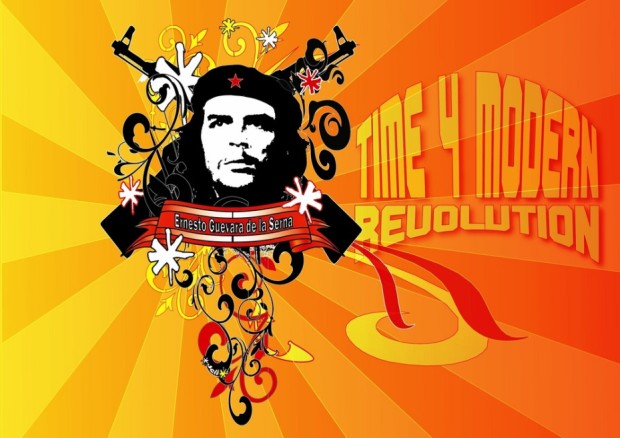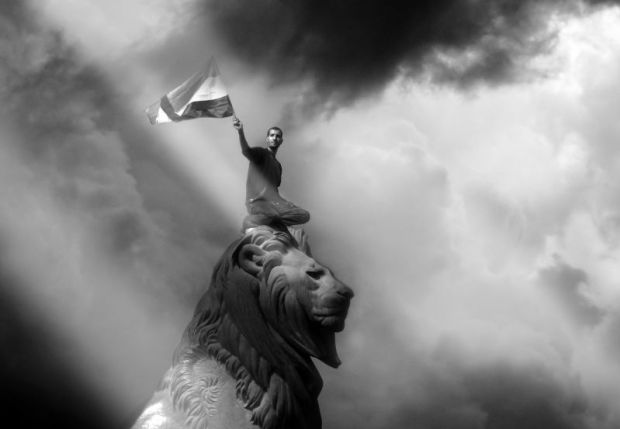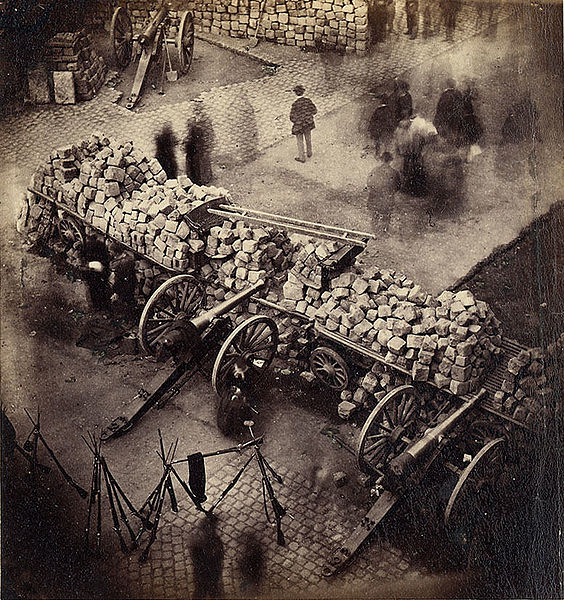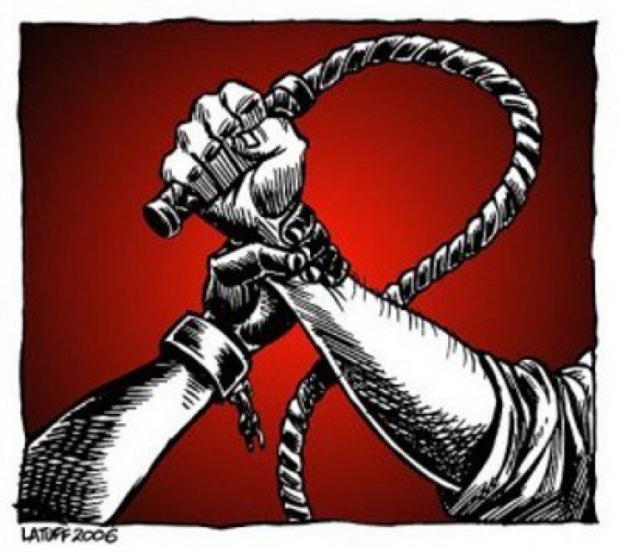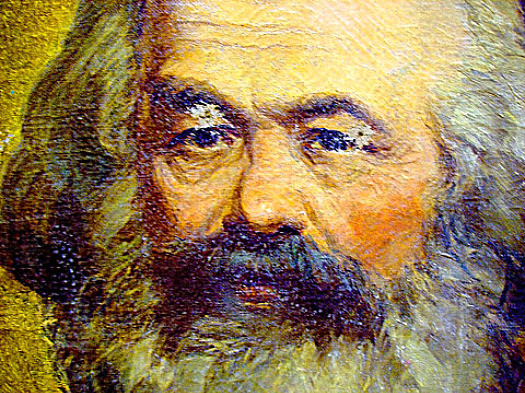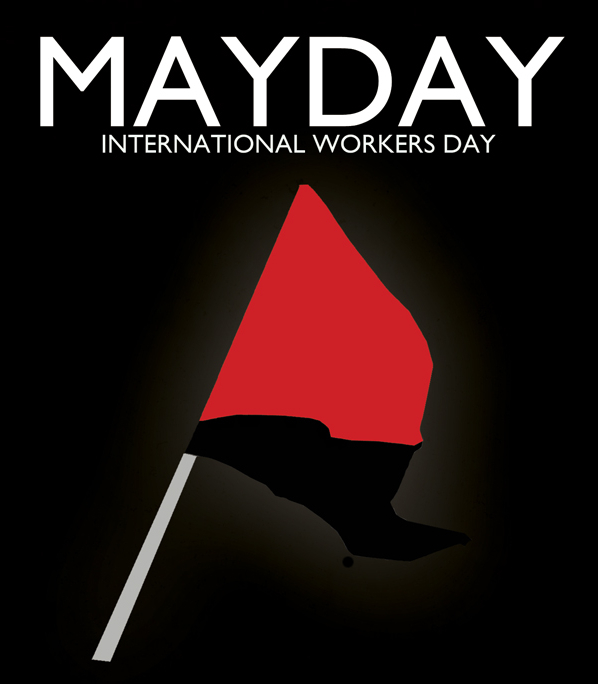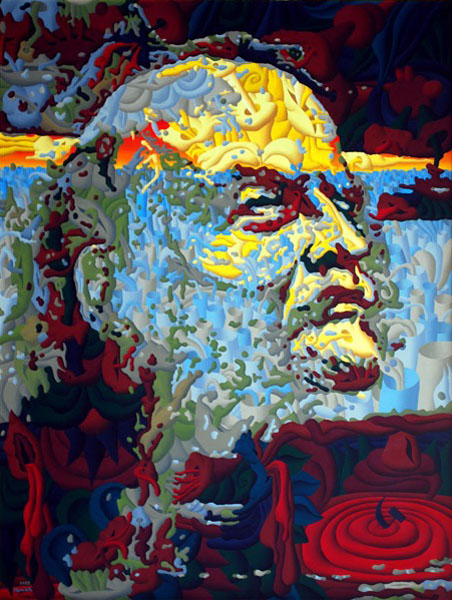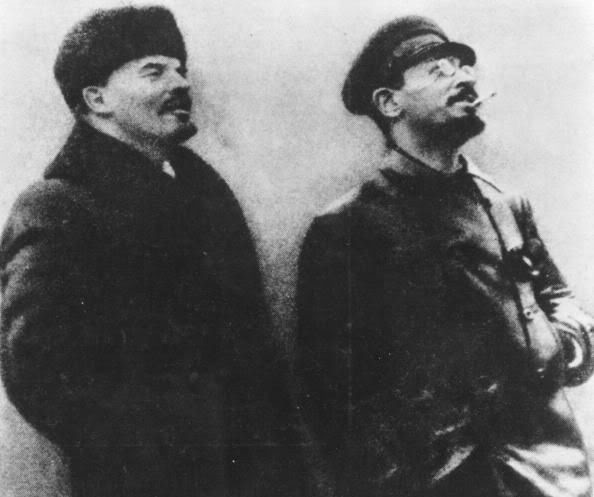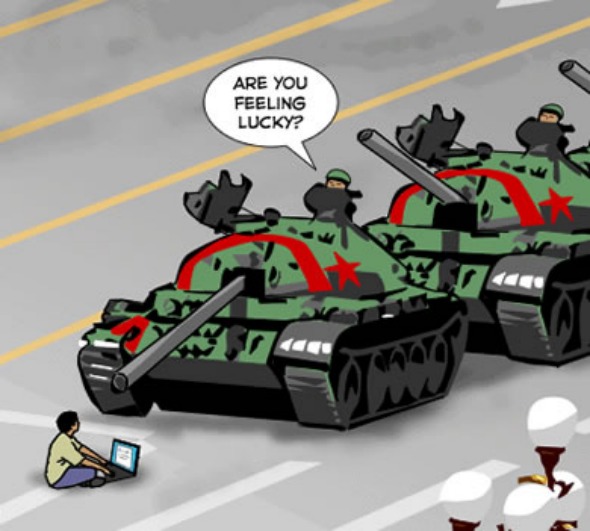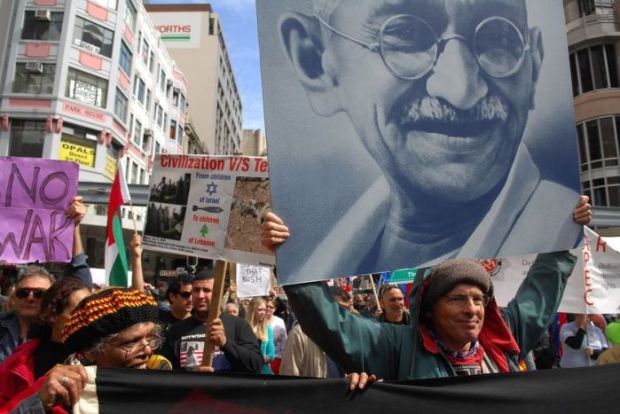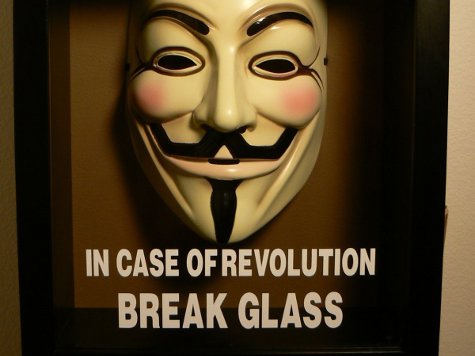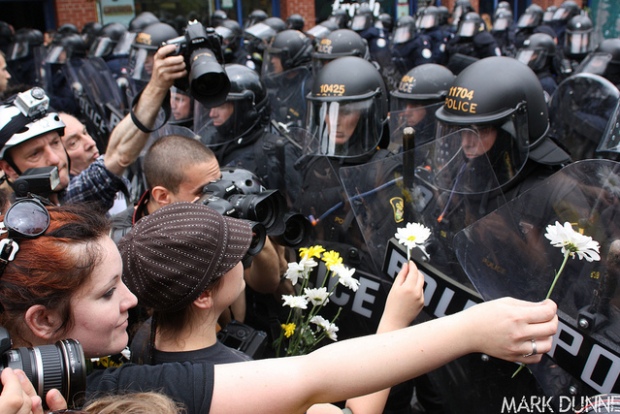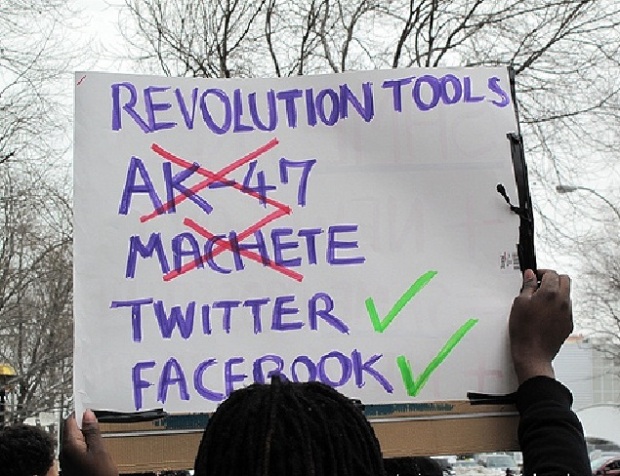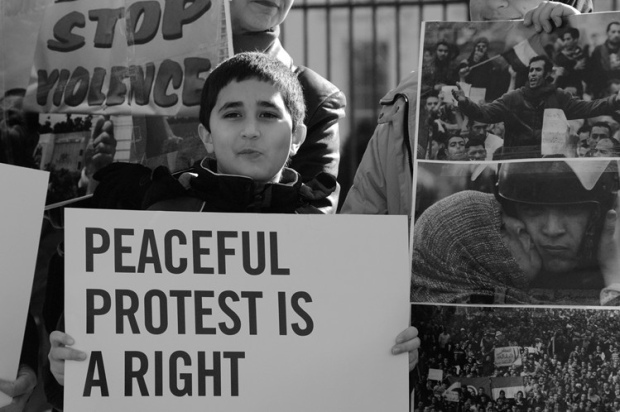That ruling classes can still be constrained by political and moral costs tells us something of profound positive importance. Today, revolutionary politics must be resolutely non-violent — the goal of movements for fundamental social change can no longer be to overthrow the state by force, but to overwhelm the state’s legitimacy through organizing a gigantic, unified movement…
by Jeff Noonan Philosophers for Change July 23, 2013
On May 31st what began months before as opposition to the cutting down of trees in Taksim Square in Istanbul exploded into country-wide opposition to the increasingly authoritarian rule of Prime Minister Recep Tayyip Erdogan. As was the case with the Arab Spring and Occupy, the Turkish youth and workers’ movement caught global commentators unawares. Turkey had been held up as a model of “moderation” amongst “Muslim” countries: tolerant, democratic, capitalist, a NATO member, and a trusted American ally. Suddenly, the social fissures that had opened up the space for revolution in Tunisia and Egypt, for Occupy in North America, and for movements for real democracy and an end to austerity in Greece and Spain had cracked open Turkey too: a disconnect between the values and goals of youth and workers and the economic and political priorities of the government. In an essay written to explain the unanticipated uprising, Sungur Savran called the movement, “une revolte, pas … une revolution.”[1] His point was that those occupying Taksim Square had immediate and specific demands which, if met, could defuse the crisis. A revolution, by contrast, makes demands that cannot be met by changed policies or even changed governments, but require fundamental social changes. The question is, therefore, what is the nature of the changes demanded that makes them “fundamental,” or revolutionary?
A revolt seeks to oust a government which has lost legitimacy or reverse a hated policy, but does not call into question the legitimacy of the entire social system, its institutions, its class structure, and its ruling value system. The basic difference between revolt and revolution is one of scale and scope — revolts are particular, revolutions are comprehensive, revolts have demands that can be satisfied without change of ruling class and value system, revolutions aim to change the structure of power, the organization of major institutions, and the ruling value system. There is, thus, continuity across the history of revolutionary struggle: wherever there are fundamental institutional and value changes, there is revolution.
Subscribe or “Follow” us on RiseUpTimes.org. Rise Up Times is also on Facebook! Check the Rise Up Times page for posts from this blog and more! “Like” our page today. Rise Up Times is also on Pinterest, Google+ and Tumblr. Find us on Twitter at Rise Up Times (@touchpeace).
Within this broad and abstract continuity there are also differences, and it is most important today to understand those differences. While revolutions have always involved fundamental changes in value system, social institutions, and ruling class, the content of those fundamental changes — the substance of the new value system, the character of the institutions, and the identity of the incipient ruling class — alters over history. These changes of content have had implications for revolutionary form — its justifications, its methods, and its leaders. Understanding these changes at this conjuncture in history is particularly important, because intensifying political instability across the globe indicates that we may be entering a revolutionary period (one in which the subaltern classes refuse to be ruled in the old way and rulers cannot rule in the old way) at a time when revolutionary politics, at least in the Global North, is still associated with the catastrophe that was Stalinism. The important question is thus not “what does revolution mean in the abstract,” but rather “what does revolution mean today?” Can there be a revolutionary politics that learns from the failures of twentieth century revolutions how to avoid degeneration into the violent rule of an undemocratic and unrepresentative “vanguard” claiming to speak in the interests of those it brutally oppresses?
In order to answer this question we need to proceed historically, first examining the difference between the ancient world’s understanding of revolution and the modern world’s, and then examining the emergence of the Marxist understanding of revolution from the modern. Central to both the modern and Marxist understanding of revolution is the idea that it involves the political overturning of conditions that block the institutionalization of universal human interests. The difference between them comes down to a difference in understanding the content of those universal interests. Revolution today retains the connection between politics and the removal of structural barriers to the institutionalization of universal human interests, but the failures of twentieth century forms of revolutionary practice entail refinements in the understanding of the content of those interests and a rejection of vanguardism as a viable political means by which their more comprehensive institutionalization may be sought. The twentieth century has made clear that militarization of revolutionary political struggle and the more comprehensive satisfaction of universal human interests are antithetical. Revolutionary politics in the Global North today means using the spaces for democratic organization that previous revolutions have pried open for mass, militant, but resolutely non-violent organizing and action against intransigent ruling classes whose legitimacy is compromised because they reduce democratic institutions to tools for their own private interests.
I: What has Revolution meant?
In the ancient world political revolution was understood in essentially geometrical terms. Societies were assumed to move in cycles of degeneration and development in which power passed to different groups of people. Thus “revolution” did refer to instances of structural social change, but these changes were plotted along a natural continuum of decline and restoration not itself subject to change by organized political means. For example, in Plato’s typology of states in Book Eight of The Republic, democracy develops out of a revolution of the poor against oligarchy, but in turn necessarily degenerates into tyranny, both the nadir of social organization and the first moment of the regenerative movement.[2] There are two key differences between the ancient and modern conceptions of revolution. The first is that the ancient conception does not recognise the possibility of permanent breaks between an unjust past and a just future, and the second is that it does not regard human beings as capable of full self-determination. Societies cannot fully escape their past and human beings cannot fully determine their social and political lives because human societies are embedded in natural cycles and forces beyond the reach of human politics. The modern idea of revolution is born with the Enlightenment’s rejection of these core principles of ancient thought.
Enlightenment ideas about revolution were not created ex nihilo, but drew on a body of theory and political practice that had been developing throughout the seventeenth century. Copernicus, Galileo, Descartes, and Locke challenged scientific and philosophical orthodoxy and exposed its limitations. Politically, the English Revolution of the 1640’s overthrew the monarchy and opened the door to the political power of an emerging capitalist landowning class, demonstrating as convincingly as one could imagine that social orders are impermanent and subject to deliberate change. When combined, the critique of scientific and philosophical orthodoxy, the new discoveries that critique made possible, and the success of the English Revolution formed a matrix within which a new idea of progress emerged. The modern idea of revolution incorporated this new idea of progress. Revolution came to mean a consciously organized social process whereby the shackles of the past (superstition, aristocratic rule) were cast off once and for all. Rather than orbit around an eternal cycle, revolution came to signify permanent break with the past that enabled permanent improvement in science, in technique, in political and social organization.
The philosophical, scientific, and political achievements of the seventeenth century gave rise to a self-ramifying series of increasingly radical changes in the eighteenth century. These increasingly radical changes — the anti-colonial revolution of America against the British helped inspire the French Revolution which asserted theuniversal rights of human beings which inspired the slave rebellion in San Domingo (Haiti) against French rule and the slave trade — were all predicated on the new legitimacy of the general practice of revolution. The basic idea of conservatism — that there is wisdom in the past — was discredited. Conservatives now took on a historically new guise as reactionaries, social groups who resisted the progressive change for which revolutionaries were struggling. Prior to the eighteenth century, radical breaks from tradition would have been regarded as unnatural, monstrous denials of human nature; at the end of the eighteenth century revolution was regarded as necessary for the full development of human nature. Condorcet provides a canonical formulation of this new idea of revolution. Generalizing from his examination of European history he concludes: “Nous avons vu la raison humaine se former lentement par la progres naturels de la civilization; la superstition s’emparer d’elle pour la corrompre, et le despotisme degrader et engourdir les esprits sous les poids de crainte et du malheur.”[3]
Change, rather than stasis, progressive development, is natural, opposed only by superstition and the despots it serves. Stasis is thus an unnatural check to social development which, since it is grounded in irrationality, will not cede to the force of the better argument, but only to force. Revolution is thus necessary to overcome unnatural blockages to human historical development. Revolutions might be political singularities, but the principles upon which they rest are universal: “les philosophees des diverses nations embrassent, dans leur meditations, les interets de l’humanite entiere sans distinction de pays, de race ou de secte, formaient … un phalange fortement unie contre … tous les genres de tyrannie.” [4]. This modern conception of revolution, as a political necessity forced on humanity by tyrannical power, is the template from which the Marxist conception of revolution was developed.
Marx and Engels and the communist tradition they engendered altered the goal and the composition of revolutionary forces, substituting overcoming capitalist class structure for “tyranny” and the proletariat for the bourgeoisie, but maintaining the underlying justification for revolution first formulated in the Enlightenment. The changes that Marx and Engels introduced expressed the failure of the eighteenth century liberal-capitalist revolutions to satisfy the universal human interests in whose name they claimed to speak. At the same time, Marx and Engels did not reject the objective reality of those interests, but instead attempted to give them more comprehensive expression. The impossibility of liberal-capitalism satisfying those universal interests is still cited as the reason why revolution is both necessary and legitimate. “For each new class which puts itself in the place of one ruling before it is compelled, merely in order to carry through its aim…to present its interests as the common interest…it has to give its ideas the form of universality, and present them as the only rational, universally valid ones.”[5] Whether these interests are fully universal or not is a question decided by practice, not philosophy. Thus, in abstract expression the class interests of the bourgeoisie in political freedom from absolute monarchy were universal, but once institutionalized proved to be concretely opposed to the class interests of workers. Hence, just as the bourgeoisie before it, the workers face a structural impediment to their freedom, an impediment which they can overcome only through a revolution of their own.
The difference between the class interest of workers and that of all previous classes is, according to Marx and Engels, that the universal interests of human beings and the particular class interests of workers coincide. If, therefore, the workers can successfully overthrow the capitalist class structure they would at the same time overthrow the social conditions — private and exclusive ownership of universally required life-resources and their exploitation for money-value — which require political tyranny. In other words, the proletarian revolution would be the final revolution because its outcome — collective ownership and control of universally required life-resources — abolishes the conditions which make any form of oppression necessary. Since there would be no private and exclusive social power having to protect its particular interests from the majority, there is no longer any need for a repressive apparatus of any kind.
The proletarian revolution thus triumphs over the conflicts that made all previous revolutions necessary:
Political power, properly so called, is merely the organized power of one class for oppressing another. If the proletariat during its contest with the bourgeoisie…makes itself the ruling class, and , as such, sweeps away by force the old conditions of production, then it will, along with these conditions, have swept away the conditions for class antagonisms and classes generally, and will thereby have abolished its own supremacy as a class. In place of the old bourgeois society…we shall have an association, in which the free development of each is the conditions of the free development of all.[6]
The proletarian revolution is thus regarded by Marx and Engels as a regrettable necessity, part of the struggle for political power which ruling class intransigence forces upon the proletariat (as monarchical intransigence forced revolution on the bourgeois before).
Revolution is thus a break with the class structure of bourgeois society, but it is also continuous with those aspects of liberal capitalism that were of universal value, in particular, democracy. Marx and Engels understood revolution as part of the “battle for democracy,” the elimination of the structural barriers capitalist society places in the way of substantive self-government. Given the vehemence with which these structural barriers will be defended by the ruling class (because from their subjective perspective these structural barriers are personal privileges) battle is necessary. Hence, revolutions must remove the old ruling class by force and employ coercive tactics against reactionaries. As Engels explains, “a revolution is certainly the most authoritarian thing there is: it is an act whereby part of the population imposes its will upon the other part by means of rifles, bayonets, and cannon, all of which are highly authoritarian means. And the victorious party must maintain its rule by means of terror which its arms inspire in the reactionaries.[7] Engels is not glorifying revolutionary violence, but drawing on the historical experience available to argue against those who oppose authoritarianism in the abstract that the democratic values they cherish can often not be advanced save by undemocratic means, because the old ruling class will protect its private interests at all costs.
This realist current in Marx and Engels is a through-line connecting their work to the great revolutionaries of the twentieth century, Lenin, Trotsky, Mao, and Che Guevara. All believed, as Marx and Engels believed, that organized armed resistance was an instrumental necessity and not an intrinsic value. If the exclusive control of the ruling class over universally required life-resources could be achieved through argument, then persuasion would be preferable. Unfortunately, ruling classes are only interested in argument as a means of dividing opposition and attenuating the process of change. The emergence of genuine democratic society thus requires armed struggle. Those who reject revolutionary violence on principle are not serious about the democratic values they claim to champion, because democracy is a way of life not an idea, such that anyone who values democracy wants to live in a democracy, and anyone who wants to live in a democracy must take up the challenges of building one in the actual historical conditions one faces. “The petty bourgeois democrats, those sham socialists who replaced the class struggle by dreams of class harmony, even pictured the socialist transformation as a dreary fantasy — not as the overthrow of the rule of the exploiting class, but as the peaceful submission of the minority to the majority which has become aware of its aims.”[8] Lenin’s historical experience contained no instance of peaceful institutionalization of universal human interests, but only the imprisonment, exile, and execution of those who defended them in practice. Like Engels, he does not glorify revolutionary violence as a virtue; he laments it as a social necessity, but is willing to use it, because he is committed to realizing the values he champions in theory in living practice.
The crucial point to take away from this brief survey of the development of the modern conception of revolution is that Condorcet, Marx, Engels, and Lenin are drawing their conclusions from concrete historical analysis of the political struggles of which they were a part or which formed the historical background to the struggles of which they were a part. The differences in their arguments derive from differences of historical context; the continuities from historical continuities. The most important continuity is the claim that revolutions advance the universal interests of humanity, in this service to social progress lies both their necessity and their moral and political justification. The most important difference is in the understanding of the social conditions required for the realization of those universal interests — overcoming the class structure of liberal-capitalism supported by Condorcet as the highest achievement of human struggle. The same problem that confronted Marx and Engels in relation to the bourgeois revolutions in whose shadow they lived confront socialists living today in the shadow of the twentieth century socialist revolutions: what is continuous with and what is different from the social conditions of the twentieth century and what implications do these continuities and differences have for the meaning of revolution today?
The continuities between twentieth and twenty-first century capitalism are clear. Capitalism remains exploitative, alienating, inegalitarian, intolerant of genuine democratic self-governance in all major social institutions, regularly generative of violent domestic and international conflict, conducive to the over-development of the worst dispositions of the human personality (selfishness, greed, ego-centrism, self-importance, indifference to the sufferings of the others, and victim-blaming) and environmentally unsustainable. The realization of the universal life-interests of human beings — the satisfaction of their life-requirements in a sustainable economy that provides real opportunities for the expression and enjoyment of valuable life-capacities, democratic self-governance in all spheres of collective life, and peaceful international and domestic social relations conducive to the formation of creative, difference-embracing, mutualistic relationships and cultural expressions — still depends upon overcoming the class structure of capitalism. The universal life-interests of human beings cannot be comprehensively satisfied when the natural resources and the social institutions required for their satisfaction remain under the more or less exclusive control of a minority class driven by the goal of maximal accumulation of money-value for itself. But there are also at least three crucial differences between the social conditions of twenty-first century capitalism and early twentieth century capitalism that necessitate important changes in the meaning of revolution today. I will discuss each of these differences and then explain their implications for the contemporary conception of revolution in the next section.
The most important difference between the political and social context in which opponents of capitalism were working in the twentieth century and the social and political context in which they work in the twenty-first is the failure of the former’s revolutionary experiments. The political centre-piece of those experiments — the vanguard party — proved capable of seizing power, but not of democratizing power once the period of initial instability had passed. Indeed, that instability was overcome only through the “authoritarian means” Engels described. The problem that Engels did not anticipate was that the practitioners of those authoritarian means continued to seek out and find new internal “enemies” long after the old ruling classes had ceased their opposition. The legacy of revolutionary vanguardism — purges, show trials, mass detentions and executions — is a legacy only a fool or a psychopathic killer would want to risk repeating. New forms of political organization are thus required, forms which somehow reconcile the goal of the complete transformation of capitalism into a democratic socialist life-economy and society with the political pluralism that everyone concerned in a credible way with advancing the project of sustainable human freedom accepts today.
The second crucial difference between the political contexts of the nineteenth and early twentieth century and our own time concerns the relative balance of armed force between states and democratic opponents. Engels’ belief that reactionaries can be “terrified” into compliance by revolutionary arms is made nonsense by the reactionaries having at their disposal the complement of weapons available to modern states. Street fighting, barricades, and even small arms are no match for tanks, drones, and stealth bombers. No irregular popular militia is any military match for the states of the Global North; if any of those states ever chose to unleash the full killing-power of their military on oppositional movements, those opposition movements would be overwhelmed in a matter of hours.
Afghanistan is not a counter-example — although US and NATO forces have not defeated the Taliban, they have not unleashed the full means of violence available to them. That which constrains them from unleashing every device they have is not any response the Taliban could mount, but the political and moral cost, especially at home, the use of nuclear or biological weapons would have. That ruling classes can still be constrained by political and moral costs tells us something of profound positive importance. Today, revolutionary politics must be resolutely non-violent — the goal of movements for fundamental social change can no longer be to overthrow the state by force, but to overwhelm the state’s legitimacy through organizing a gigantic, unified movement that rests on goals so obviously in the shared life-interest that the army and police forces refuse to protect the ruling powers, which must then concede as a consequence. In this choice lies the difference between Egypt — a successful revolution that was captured by reactionary forces but in which the opposition lives to continue the struggle, and Syria, a brutal civil war that is hardening sectarian divisions and in which the fractured opposition is being slaughtered.
The need to reject armed violence and political vaguardism brings us to the third and most important difference between nineteenth and twentieth century conceptions of revolution and today’s. The difference is that in the nineteenth and twentieth centuries the battle of (political) democracy had not been won. The space for democratic opposition in Russia, Germany, and China was constrained by vestiges of monarchical authoritarianism; in the Global South, revolutionaries confronted violent, racist, colonial administrations. Armed struggle was not a choice, it was, as Lenin argued, a necessity where there were no mature, functioning democratic alternatives. For the reasons cited in points 1 and 2, armed vanguardism is no longer an option: it has been discredited by the failure of twentieth century revolutions to produce stable democratic socialist alternatives to capitalism, and struggles conducted on military terms will always prove favourable to states which enjoy an overwhelming military advantage against internal opposition. However, there is also no need to fight on the terms of the twentieth century, because the principle, if not the practice, of democracy has been fully accepted and incorporated into the institutional structure of the major capitalist societies. Democratic societies can change themselves if a stable majority of citizens is committed to changing them. The major explosions in the last five years — from the Arab Spring to Occupy to Turkey — have all been fuelled by demands that ruling classes respect ordinary people by respecting democracy. Revolutionary vanguardism has been discredited in the popular imagination, mass democratic action has not.
In any society in which the democratic principle — all affected by a decision should be able to participate in its formulation and execution — has been institutionalised, there is no legitimate way for ruling classes to prevent its more extensive and intensive application.[9] Revolutionary politics today thus means building mass movements against the illegitimate attempts of ruling powers to prevent the legitimate extension and deepening of democratic governance of all major social institutions in the shared life-interest. This conception of revolution — fundamental social change led by a clear understanding of common life-interests achieved by means of peaceful democratic struggles of movements capable of winning by force of argument and not force of arms — is what oppositional movements require, not only to avoid the mistakes of the past, but to actually solve the structural problems of the present. In the next section I will unpack this understanding of what revolution means today.
II: What Revolution means today
As noted, the legitimacy of revolution since the Enlightenment has been grounded in the universality of interests purportedly represented by revolutionary classes and served by their political organizations. The failure of those organizations to create stable democratic socialist societies raises questions about the universality of the interests they serve. For Marx, the history of revolution was the history of the progressively more inclusive scope of revolutionary movements: bourgeois parties served bourgeois interests, which were more universal than aristocratic interests, but still exclusionary. The proletarian movement served proletarian interest, but these interests were universal, because the proletariat, the class whose labour is responsible for social reproduction and development, has no need to exploit the labour of any other class. “Only the proletarians of the present day,” Marx wrote,
who are completely shut off from all self-activity, are in a position to achieve a complete and no longer restricted self-activity, which consists in the appropriation of the totality of the productive forces and in the thus postulated development of a totality of capacities. All earlier revolutionary appropriations were restricted… In all appropriations up to now, a mass of individuals remained subservient to a single instrument of production; in the appropriation by the proletarians, a mass of instruments of production must be made subject to each individual and property to all.[10]
Yet, in each case of twentieth century socialist revolution, the workers found themselves subordinated anew, not to a ruling class, but to the vanguard party which began its life claiming to be the self-conscious expression of the universality of working class interests. The reconstitution of the vanguard party as a permanent ruling power alienated from the lives and goals of working people raised questions, both about whether working class interests were really universal, and, more fundamentally, whether there were any universal human interests at all.
It is clear that there are universal human interests, but, as human, they do not fully coincide with the social interests of any particular class. The universal interests of human beings are grounded in the need to satisfy certain fundamental natural and social requirements of biological life and social and cultural development. Working people share these interests with every other human being. The unique problem that working people face is that they cannot access those goods and services their own labour produces without the money to pay for them, but labour markets do not necessarily provide labour and a living wage to all who need it. This structural dependence of working people on labour markets for the money they require in order to purchase the natural and social necessities of life and human development gives them a cross-class social interest in overcoming this structural dependence on labour and commodity markets. The universal interests, however, are deeper — they are the life-interests in need-based access to the full range of life-requirements which must be satisfied if the full range of human capacities is to be developed, expressed, and enjoyed in each human life. The political conflict is between classes, the moral fault line the political conflict reveals is between a ruling value system that prioritises money-value appropriation by the ruling class over the satisfaction of the universal life-interests. If we agree with Marx that each successive revolution is construed on a more universal basis than the last, then a socialist revolution is not grounded in the social class interests of the proletariat, but the universal life-interests threatened by capitalist social dynamics and ruling-value system.
The revolution that is needed today is not a revolution of the proletariat against the bourgeoisie — even using those nineteenth century terms sounds anachronistic — but a revolution of the common life-interest against the life-blind dynamics of globalized capitalism, dynamics which are compromising the life-support capacity of the biosphere and which turn all life, bacterial, plant, animal and human into exploitable tools of their reproduction and expansion. To be sure, working people, those whose lives are dominated in almost every dimension by the need to compete for scarce work in order to merely live, must be at the forefront of new organizations of political opposition. Their position in production still gives them tremendous potential social and political power, should this power be organized nationally and internationally. But it is not workers as workers that embody the universal life-interest; the universal life-interest is basic, each human being is an embodiment of it, the content of the universal life-interest is constitutive of what it is to be a human being. Hence, consciousness of the universal life-interest is not identical to class consciousness. Therefore, it cannot be represented by a vanguard party of the early twentieth century form. We need to understand precisely why it cannot be.
First, although the working class is composed of people of different sexes and sexualities, different races and ethnicities, different ranges of ability and interest, the ways in which these differences become grounds for oppression in a capitalist society cannot be understood through the lens of class exploitation. However, they canall be understood through the lens of common life interests, which proves that class exploitation and the common life-interest are not identical. While every form of oppression has its own complex history, each is a form of systematic deprivation of some set of life-requirements. The experience of oppression is the experience of structurally imposed barriers to free self-expression and development. The ideological justification of oppression is also structurally identical across particular cases. Wherever one finds oppression, one finds ideologies of invidious hierarchy, according to which the oppressed group is not denied anything it actually needs, because it is not ‘civilised’ or ‘rational’ enough to properly use that which the laws and mores of the society prevent it from accessing. If class exploitation is not the common fount of all forms of oppression, then class consciousness cannot be the basis of political unity between working people and other oppressed groups, whether members of the working class or not. Consciousness of the shared life-interest could be that basis, but its becoming so is not the automatic outcome of a reified dialectic of political development, but deliberate political argument and construction.
Second, that which is required by each and all as universal condition of the development of the totality of human capacities goes beyond Marx’s “totality of the instruments of production.” Working people have a social interest in owning and controlling the means of production, and a society grounded in life value presupposes a democratic economy in which universally required life-resources and productive institutions are commonly owned. But it also requires respect for life as an intrinsic value, recognition of the material priority of the biosphere as a life-support system, and consequent limits to productivity and economic ‘growth;’ it requires the capacity to slow down, to leave possibilities unrealized, to relate to each other mutualistically, to value receptivity and passivity and sensuousness.
It is true references to all of these requirements of a life-valuable society can be found in Marx and the Marxist tradition, but they are not central to its understanding of revolutionary goals, much less revolutionary practices. When it comes to revolutionary practice, Marx, Engels and the Marxist tradition tend towards ruthless political realism, focussing on revolution as an instrument by which one class power is replaced by another. Taking and then maintaining power begin their lives as instruments of revolutionary values, but, historically, they have then become ends in themselves. At the point where they become ends in themselves the rifles and cannons that Engels said were to frighten the reactionaries get turned against anyone who questions any decision of the leading party faction. From the life- value perspective, taking and maintaining power are only ever instrumental values and can never be allowed to become ends in themselves. Successful life-value revolution is thus resolutely opposed to “by any means necessary” thinking. Revolutionaries who are willing to do anything have always proven ready to do anything to anybody, including people supposedly on their side.
Third, and more practically, slogans of workers’ power do not move a majority of people today, even in those sites of intense capitalist crisis. In Greece and Spain, the radical left has been revivified by the crisis, but it does not speak the language of workers’ power, but of “real democracy.”[11] That which matters to people today is not that workers attain power as a class, but that the institutions of political democracy — themselves the inheritance of a longer revolutionary heritage — actually function democratically, and not as the exclusive instruments of (especially finance) capital. The old class divide is still present, the structural subordination of people’s life-requirements and life-horizons to money-value is still the fundamental material and normative problem, but no one believes that a vanguard worker’s party is the political form that a workable solution requires. There is a growing awareness that genuine progress towards the more comprehensive institutionalization of life values requires an end to the exclusive power of a single class, but that overcoming this rule is not going to be accomplished through a once and for all blow that knocks them from their perch. Instead, the idea of revolutionary change as an on-going process of learning and experimentation (Occupy, for example) is emerging.
While vanguardism has no purchase on the political imagination at present, it does not follow that nothing of use can be learned from its history. In particular, Trotsky’s theory of the permanent revolution remains relevant, although not perhaps in the way he would have expected. The theory maintained that in order to succeed the bourgeois democratic revolution in Russia would have to become socialist, because the bourgeois democratic parties would consolidate their own rule as soon as they attained power, subordinating the workers and peasants to their class interests.[12] The significance of his argument is not restricted to the unique circumstances of Russia, but is of general importance, for it is rooted in the idea that revolutions are not events but processes: “It is not a question of a single ‘blow,’ or of a single day or month, but of a whole historical epoch. It would be absurd to try to fix its duration in advance.”[13] If it is true that revolutions take place over entire historical epochs, and that it is impossible to fix the duration of a revolution in advance, then it is possible to look differently at the epoch stretching from the Enlightenment to the present. This entire epoch can be understood as a period of permanent revolution in which the material implications of democracy are being worked out. Marxism and socialism are, in this view, not the antithesis of liberal-capitalism, but extensions and developments of the democratic principle first introduced during the revolutions of the eighteenth century. As we have seen, Marx and Engels saw the socialist revolution as part of the “battle for democracy,” and socialism is, in its most basic sense, democratization of economic relationships and institutions.
It is possible to read this epoch in this way because the idea of democracy is the real revolutionary rupture with the hierarchical and aristocratic civilizations of the Middle Ages and antiquity.[14] Democracy is the political form of the rule of the universal life-interest because it is the only political form that allows everyone to speak. The universal life-interest is not an abstraction that exists apart from the individuals whose nature embodies it. Nor is it the free-floating product of abstract political deliberations and argument. It is the real basis of the existence of everyone as real living individuals. It is the substance from which democratic deliberation proceeds, not the invention of those deliberations. However, in hierarchical societies in which only those with the proper bloodlines or sex or colour are allowed a voice, the life-interests of the subaltern are defined for them, and never in ways that recognise the full scope of those life-interests. Democracy is revolutionary both because it allows those who have been historically oppressed to say: “We have the same scope of life-requirements as you, and we will take what we need because it is our due as individuals,” and it allows the response: “You are right, but you do not have to take that which is your due by force, because your being human beings and your being members of a democracy entitles you that which you require, so all of us together will re-structure our institutions such that you receive that which you require.”
George Herbert Mead lacked the concept of universal life-interests and nowhere showed any understanding of the need to extend the principle of democracy into the economy, but he did understand its revolutionary significance. “Democracy,” he argued “incorporated the principle of revolution into its institutions. That is, when you set up a constitution, and one of the articles in it is that the constitution can be changed, then you have, in a certain sense, incorporated the very process of revolution into the order of society. Only now it is to be an ordered, a constitutional revolution, by such and such steps.”[15] What Mead and twentieth century followers like Habermas either ignored or downplayed is the way in which class power can constitute a structural impediment to the rule of the shared life-interests in a formally democratic society. Where class interests function to systematically block the rule of the shared life-interests, organized struggle against them is required. But in a state that has already crossed the bridge between aristocracy and democracy this struggle, though organized and extra-parliamentary, in the workplace and streets and neighbourhoods, need not be violent, because it is already legitimate by the constitutional norms that everyone claims to accept. If those constitutional norms are not a sufficient principled basis to ensure the rule of the common life-interests, then the constitution can be amended, as Mead notes, or even, as in Venezuela, completely rewritten. The point is: the victory of democracy is the victory of political struggle over the conditions that necessitated armed violence and vanguardism.
Marx and Engels themselves were not blind to the possibilities that democracy — largely a result of working class and women’s struggles — afforded working people.[16] As Hal Draper argued, “Marx was the first socialist thinker and leader who came to socialism through the struggle for liberal democracy.”[17] Marx himself argued to the International Working Men’s Association that “You know that the institutions, mores, and traditions of various countries must be taken into consideration, and we do not deny that there are countries — such as America, England… where the workers can seize power by peaceful means.”[18] The traditions, mores, and institutions of every country in the Global North — the site from which global capitalist exploitation of all the peoples of the globe is launched and to which the vast majority of the wealth generated flows — rule out the possibility that groups who preach “arm the workers,” “for the dictatorship of the proletariat” will have any political relevance.[19] Overcoming the undemocratic power of the ruling class and money value will not be accomplished by nineteenth century means. Nor, it should go without saying, will it be accomplished by voting for any existing political party. It will be overcome through a combination of local struggles to protect existing life-value standards and nation-wide and global struggles, led by political movements yet to be created, to claim back control over the universally required life-resources currently exploited by the money-appropriating class and the (formally) democratic institutions through which their rule is legitimated and protected.
What exactly that political movement — or, more likely, movements — will look like is an open question. Occupy, The Movement for Real Democracy (Spain), Syriza (Greece), the Venezuelan socialist party are all experiments in finding that form. That which they all share in common is the principle of democratic non-violence as the political foundation of opposition and demands for change. Its significance is brilliantly captured in this reflection on the Egyptian revolution: “This significance of Egypt…is threefold. First is the moral force of non-violence… Second, non-violence of the multitude makes possible a new politics of inclusion. And finally, it makes possible a radically different sense of the worth of the self. Unlike violence, non-violence does not just resist and exclude. It also embraces and includes, thereby opening up new possibilities.”[20]
The full flowering of those possibilities takes longer than individual political agents would hope. People understandably want to see solutions to the problems they have spent their lives fighting against come to fruition in their life time. But such cannot always be the case, and trying to rush and force history often leads to far worse results than patience. The Egyptian revolution has not yet achieved its social and economic aims; but would you rather be alive in Egypt to continue to fight, or dead in a civil war like Syria?
End notes:[1] Sungur Savran, ” This is a Revolte, Not (Yet) A Revolution , ” The Bullet No. 834, June 5 th , 2013. (http://www.socialistproject.ca/bullet/834.php )[2] Plato, The Republic, G.M.A. Grube, trans, as revised by C.D.C. Reeve, (Indianapolis: Hackett), 1992, p. 227, 557a.[3] Condorcet, Sketch of a Table Proges History of the Human Spirit , (Paris: Flammarion), 1988, p. 213 “We-have seen human reason Develop slowly through the natural progress of civilization.; superstition HAS tried to Prevent this progress, in order to corrupt it and despotism HAS degraded and numbed it under the weight of fear and evil. “(My translation).[4] Ibid., p. 230. “The Philosophers of diverse nations, by embracing in their reflections the interests of humanity as a whole, without distinction of country, race, or sect, formed…a powerful phalanx strongly united against all manner of tyranny.” (My translation)[5] Karl Marx and Friedrich Engels, The German Ideology, (Moscow: Progress Publishers), 1975, p. 68.[6] Karl Marx and Friedrich Engels, The Communist Manifesto, (Moscow: Progress Publishers), 1986, p. 54.[7] Engels, quoted in Vladimir Lenin, The State and Revolution, (Moscow: Progress Publishers), 1975, p. 60.[8] Ibid., p. 27.[9] David Beetham, Democracy and Human Rights, (Cambridge: Polity Press), 2004, p. 5.[10] Marx and Engels, The German Ideology, p. 97.[11] See for example the manifesto of Spain’s Real Democracy movement. Jerome Roos, “Manifesto — Spain’s Real Democracy Now!” http://roarmag.org/2011/05/m-15-manifesto-real-democracy-now-spanish-revolution-protests/ (accessed, June 7th , 2012).[12] Leon Trotsky, The Permanent Revolution and Results and Prospects, (New York: Pathfinder Press), 1969, pp. 276-281.[13] Ibid., p. 210.[14] Even though the practice of Athenian democracy was far more democratic than the practice of contemporary liberal democracy, it was at constant war with aristocratic and patriarchal values (represented paradigmatically in classical Greek philosophy) which never ceased to be parts of the background culture.[15] George Herbert Mead, On Social Psychology, (Chicago: University of Chicago Press), 1997, p.20. [16] On the role of working class and other major social struggles to the origin of contemporary democracy, see Dietrich Rueschemeyer, Evelyne Huber Stephens, and John D. Stephens, Capitalist Development and Democracy, (Chicago: University of Chicago Press), 1992. On Marx and Engels signal contribution to democratic development see August Nimtz Jr., Marx and Engels: Their Contribution to the Democratic Breakthrough, (Albany: State University of New York Press), 2000. [17] Hal Draper, Two Souls of Socialism, Chapter 3, p.2. (http://www.anu.edu.au/polsci/marx/contemp/pamsetc/twosouls/twosouls.htm) (Accessed June 19th, 2013).[18] Karl Marx, “The Possibility of Non-Violent Revolution,” The Marx-Engels Reader, Robert . Tucker, ed., (New York: Norton), 1978, p. 523.[19] Academic arguments about the democratic meaning of “dictatorship of the proletariat” will also not make any difference — the slogan is irredeemably compromised by its association with failed Stalinist societies, and ignores, contrary to the practice of historical materialism, the actual course of historical change over the past 150 years. For an example of such a problematic academic exercise see Peter Halliward, “People and Power: Four Notes on Democracy and Dictatorship,” What We Are Fighting For, Federico Campagna and Emanuele Campiglio, eds., (London: Pluto Press), 2012, pp. 61-73.[20] Mahmood Mamdani, “An African Reflection on Tahrir Square, African Awakenings, Firoze Manji and Sokari Ekine, eds., (Cape Town: Pambazuka Press), 2012, p. 209.

This work is licensed under a Creative Commons Attribution-NonCommercial-NoDerivs 3.0 Unported License.
If publishing or re-posting this article kindly use the entire piece, credit the writer and this website:Philosophers for Change, philosophersforchange.org. Thanks for your support.

